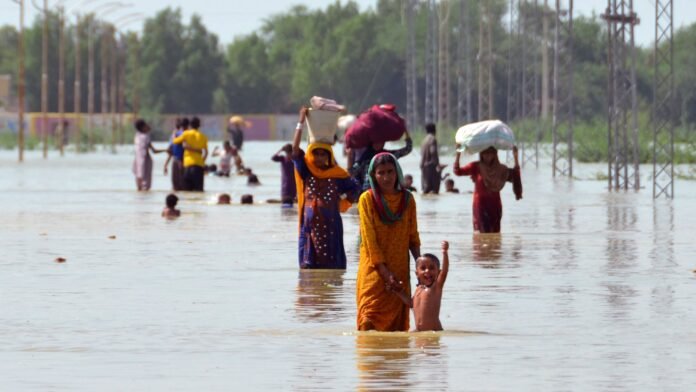During a recent Public Accounts Committee (PAC) meeting, it was disclosed that a $3 million grant, originally designated for Pakistan’s 2022 flood victims, was instead diverted to provide humanitarian assistance to earthquake survivors in Turkiye and Syria. This redirection of funds has raised concerns regarding the intended allocation of relief resources and their impact on Pakistan’s flood-affected communities.
The PAC meeting, chaired by Junaid Akbar Khan, involved a thorough review of audit reports related to the National Disaster Management Authority (NDMA) and the Ministry of Communications for the fiscal years 2022-23 and 2023-24. During the session, audit officials presented findings that revealed Rs. 552.599 million, which was provided by the Asian Development Bank (ADB) for emergency flood relief efforts in Pakistan, had been repurposed to support international disaster response.
According to the audit report, the funds were originally allocated under an agreement signed on September 16, 2022. The agreement clearly specified that the financial assistance was meant for purchasing emergency relief supplies, such as winterized tents and blankets, to aid the victims of Pakistan’s devastating floods. However, the auditors discovered that these critical supplies were instead dispatched to Turkiye and Syria, depriving Pakistani flood victims of the much-needed assistance that had been planned for them.
The revelation sparked a debate within the committee regarding the misallocation of resources and the potential consequences for Pakistan’s disaster response efforts. Committee members raised concerns over the decision-making process that led to the funds being diverted without apparent consultation or transparency. They also questioned the impact of this reallocation on the lives of Pakistani flood survivors, many of whom were still struggling with the aftermath of the natural disaster.
Defending the decision, NDMA officials explained that the redirection of resources was carried out on the directives of the Prime Minister, citing the urgent need to respond to the severe earthquakes that struck Turkiye and Syria. They argued that the humanitarian crisis in these regions required immediate action and that Pakistan had stepped up as part of its commitment to international relief efforts. Additionally, NDMA representatives assured the committee that the supplies sent abroad were later replenished and restocked to ensure Pakistan’s flood victims did not face a shortage of aid.
Despite these assurances, the issue has raised broader concerns about governance, accountability, and the proper management of disaster relief funds. Critics argue that while international humanitarian assistance is commendable, it should not come at the expense of the country’s own disaster-stricken population. Transparency advocates have called for more stringent oversight mechanisms to ensure that relief funds and resources are utilized strictly for their designated purposes.
The controversy surrounding the diversion of funds underscores the need for clearer policies and accountability measures in disaster management. With Pakistan frequently facing natural disasters, including floods and earthquakes, experts stress the importance of maintaining a well-structured and transparent relief distribution system to effectively address both domestic and international crises.
The committee has urged the NDMA and other relevant authorities to provide a more detailed explanation regarding the decision and to submit a report clarifying how and when the diverted resources were replenished. Meanwhile, humanitarian organizations and public policy experts continue to call for reforms to ensure that future relief funds are used efficiently and in accordance with their original purpose, prioritizing the needs of those who are most affected.





